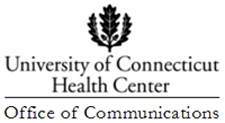

Press Release

Contact: Kristina Goodnough, 860-679-3700 |
News Release |
UConn Dental School Triples Care to Underserved
Robert Wood Johnson grant helps school expand care to
poor and recruit minority dentists
FARMINGTON, Conn. – The University of Connecticut School of Dental Medicine, already the largest single provider of dental care to the state’s poor, will more than triple its services to underserved populations over the next five years with a grant from The Robert Wood Johnson Foundation.
With the $1.4 million grant, the dental school will revise its curriculum to increase its students’ current commitment of 22 days of dental care to inner city and other disadvantaged populations in the state to 75 care days. In addition, the dental school will expand its affiliation with community health centers, a step that provides additional sites around the state where dental care is provided. The grant will also provide additional funds to the Health Center’s Health Career Opportunity Programs to strengthen its recruitment of minority students.
The grant, which was given to the UConn School of Dental Medicine and nine other dental schools around the country, is part of the foundation’s program called Pipeline Profession and Practice: Community Based Dental Education. It is designed to increase the number of minority dentists in the country and to provide dental care to underserved populations.
“This is a significant grant to our school that will enable us to vastly expand our care to the state’s underserved population,” said Monty MacNeil, D.D.S., M.S., associate dean for academic affairs for the School of Dental Medicine. “It will also help us step up our efforts to recruit minority students into dentistry,” said MacNeil. “Although Connecticut has a high per capita income and a relatively large number of dentists, the state suffers from a severe and growing problem of lack of access to dental care, especially among the state’s poor and minority populations,” he said. “By moving a greater portion of our students’ education out into the community, we believe we can help address that need and, in the process, help produce more qualified dentists,” said MacNeil.
According to the state Department of Social Services, 71 percent of Medicaid enrolled children did not visit a dentist in 1999. One of the problems, according to the state Department of Public Health, is that only a small number of Connecticut’s 2,680 dentists provided significant levels of care to Medicaid beneficiaries. The problem is underscored, according to public health officials, by the fact that 54 percent of Medicaid-enrolled children live in large urban areas where only 18 percent of dentists practice.
Currently, over 50 percent of the 80,000 annual patient visits to the faculty practice at UConn’s dental school are by Medicaid-eligible adults. And, through its dental clinics around the state, the dental school provides nearly 30 percent of all treatment to Medicaid-eligible youngsters under the age of 18.
“The lack of minority members in dentistry is reaching crisis proportions,” says MacNeil. “We want to recruit more minority students, but we also want all our graduates to help provide more care to underserved populations. We believe this program will help our students increase their cultural competency and become more comfortable in different health care environments. This is an important first step in changing the practice patterns of our graduates,” said MacNeil. “We want them to think more about public service, about caring for the disadvantaged and poor, even about taking a year or two or longer after graduation to practice in inner city clinics like the ones they will experience through this program.”
The dental care to the underserved will occur largely in students’ senior year in community-based clinics and in hospital clinics and private practices. The students will team with faculty members and residents or fellows from the Pediatric Dentistry and the Advanced Education in General Dentistry programs or with community dentists in private practices around the state.
“In addition to other curriculum changes, we will add a public health policy course, so our students can gain a better awareness of the environment and the issues they will face as health care professionals,” said MacNeil.
The Robert Wood Johnson foundation, based in Princeton, N.J., is the nation’s largest philanthropy devoted exclusively to health and health care.
- - -
The University of Connecticut Health Center includes the schools of medicine and dental medicine, John Dempsey Hospital, the UConn Medical Group, UConn Health Partners and University Dentists. Founded in 1961, the Health Center pursues a mission of providing outstanding health care education in an environment of exemplary patient care, research and public service.
Note: News professionals are invited to visit the Office of Communications homepage at http://www.uchc.edu/ocomm/ for archived news releases and other information.